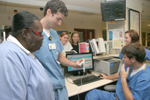|
|
|

|
MICU study aims at reducing bed sores
|
by Cindy Abole
Public Relations
As a method to improve patient care and outcomes, the Medical
University Hospital has turned to digital photography and other best
practices to lower the incidence of hospital-acquired pressure ulcers
(HAPUs) or bed sores among the hospital’s most critically ill patients.
Each year, HAPUs affect more than 2.5 million people per year and are
attributed to about 60,000 deaths annually, according to a September
2007 Wall Street Journal article. Also the cost of treating HAPUs can
become a burden to health care facilities due to the need for special
equipment, supplies, lab testing, length of stay and staffing. In
October 2008, the federal Centers for Medicare and Medicaid Services
stopped the reimbursement for HAPUs, which challenged medical
institutions to organize pressure ulcer prevention programs and best
practices among staff.
 MICU unit secretary
Joyce Fredrick, left, reviews some digital photos taken by second-year
medical student Brett Hoffecker as fellow student Zack Coffman prepares
to enter images into a patient’s electronic medical record. Supporting
the project are MICU nurses August Hickey, center, Andrea Coyle and
Leslie Cerenzia. The team is helping in a 90-day quality pilot
documenting the presence and care of hospital-acquired pressure ulcers
on critical care patients. MICU unit secretary
Joyce Fredrick, left, reviews some digital photos taken by second-year
medical student Brett Hoffecker as fellow student Zack Coffman prepares
to enter images into a patient’s electronic medical record. Supporting
the project are MICU nurses August Hickey, center, Andrea Coyle and
Leslie Cerenzia. The team is helping in a 90-day quality pilot
documenting the presence and care of hospital-acquired pressure ulcers
on critical care patients.
This quality improvement project, which involves a team of 70 nurses,
secretaries, medical students and physicians, was initiated on May 17
with MUSC’s Medical Intensive Care Unit (MICU) and will continue
through August. The study evaluates all eligible and consenting
patients admitted to the unit.
“We’re honored to participate in this effort to improve patient care,”
said Janet Byrne, R.N., MICU nurse manager. “The MICU staff is
dedicated to delivering a high level of quality, evidence-based care
combined with a commitment to excellence in providing cutting-edge,
technologically advanced critical care services to our patients.”
The 90-day pilot is adirective from the Medical University Hospital’s
medical director's office and led by Stephanie Sargent, an improvement
specialist in the Performance Improvement Department, to assess the
presence or absence of pressure ulcers on sacrums (backside) of
patients upon MICU admission and throughout points of their ICU stay.
After consent is obtained, pictures are taken using a digital camera
and unit printer, twice weekly and upon discharge or transfer from the
MICU. The photos are tagged and inserted to the patient’s electronic
medical record and paper chart.
“Taking photographs has anecdotally improved care and prevention of
wounds, “ said Patrick Cawley, M.D., Medical University Hospital
executive medical director. “But we need to know if this practice is
truly helpful. The MICU study will help us advance medical knowledge.”
The quality improvement project will compare MUSC’s outcomes to other
comparable hospital facilities including Duke University Medical Center
and Virginia Commonwealth University Health System. MUSC hospital
utilizes the University Health System Consortium’s database to compare
outcomes with 150 national organizations.
After the pilot, project organizers will examine data and outcomes such
infection rates, length of stay, total costs, identifying ulcers, pain
and decreased rates for nosocomial pressure ulcers.
Starting in 2009, the MICU team has been involved in a multiple center
study evaluating the effectiveness of antimicrobial copper in reducing
bacterial load within ICU patient rooms. That same year, the MICU was
recognized by the American Association of Critical Care Nurses and
received the Beacon Award for Excellence. The unit is currently
awaiting approval for the 2010 Beacon Award. In the past six months,
MICU also has been recognized for significantly low infection rates and
low specimen error rates.
Friday, May 28, 2010
|
|
|



